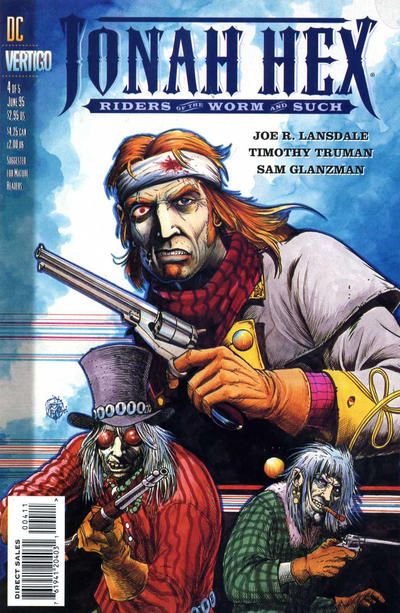Blues musician Johnny Winter passed away Wednesday in a hotel in Zurich, Switzerland, according to a post on his Facebook page. He was 70. Although details are scant, Variety reports that the Texas-born singer and guitarist had been touring in Europe, and had performed Saturday in Austria.
While Winter's passing is noteworthy due to his contributions to music, he also has a connection to comics: He and his brother Edgar Winter famously sued DC Comics in 1996, claiming they were defamed, and their rights to privacy and publicity violated, by Jonah Hex: Riders of the Worm and Such, a miniseries by Joe Lansdale, Timothy Truman and Sam Glanzman.
The Winter brothers, who were born with albinism, objected to the “villainous half-worm, half-human” characters the Autumn brothers, who share not only the musicians' first names but also their distinctive physical traits -- long white hair and an absence of skin pigment. They argued their reputations were damaged because the characters were depicted as “vile, depraved, stupid, cowardly, subhuman individuals who engage in wanton acts of violence, murder, and bestiality for pleasure and who should be killed.”
DC, and the comic's creators, insisted Riders of the Worm and Such was a work of fiction, and the characters merely parody. "It was our intent to use the Jonah Hex comic book series as a vehicle for satire and parody of musical genres, Texas music in particular, as well as old radio shows, movie serials and the like," Lansdale said. "We feel within our rights to parody music, stage personas, album personas, lyrics, and public figures.”
Following a seven-year legal fight, the case was finally settled by the Supreme Court of California, which ruled in favor of DC, finding the depictions were protected speech.
"Although the fictional characters Johnny and Edgar Autumn are less-than-subtle evocations of Johnny and Edgar Winter, the books do not depict plaintiffs literally," the court wrote in its opinion. "Instead, plaintiffs are merely part of the raw materials from which the comic books were synthesized. To the extent the drawings of the Autumn brothers resemble plaintiffs at all, they are distorted for purposes of lampoon, parody or caricature ... The characters and their portrayals do not greatly threaten plaintiffs' right of publicity."
Coincidentally, the Comic Book Legal Defense Fund wrote about the case just this week for its "CBLDF Case Files" series.


